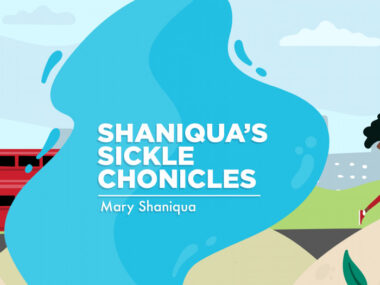When a Crisis Occurs, I Must Be Honest About the Pain
Written by |

Last weekend, I had plans to go to brunch with a group of friends I hadn’t seen in a while. We planned it quite a few weeks in advance, and I was really looking forward to being out socially and catching up with them.
But on the morning of the brunch, I woke up in a sickle cell crisis, which occurs when sickled red blood cells block blood flow, depriving tissues of oxygen. The result is inflammation and extreme pain.
I had agreed to be the designated driver that day, so instead of addressing the crisis, I went ahead and picked up two of my friends. I was so excited to see them, and the pain from the crisis wasn’t the worst in the world, so I decided to continue with the plan. I had brunch with my girls for about five hours. It was wonderful.
Except it wasn’t.
When I got home, I starting experiencing extreme pain. I had to take the highest dosage of the pain medication oxycodone that I could take, both in the immediate-release and the modified-release forms.
In retrospect, I can see that I didn’t make the best decisions that day. Recently, I haven’t been able to be as social as I would like, so I was determined to meet my friends this time around. The fear of missing out, coupled with not wanting to let my friends down, resulted in me keeping up appearances at the expense of my health.
When I woke up that morning, I was in pain, yet I continued on as normal. Admittedly, it wasn’t one of my worst pain experiences, but I could have navigated the situation better.
I omitted taking any pain relief that morning because I had agreed to be the designated driver. I didn’t modify this plan, and I picked up two friends along the way to the restaurant. When we arrived, I selected the most restrictive seat at the table, which caused my joints to seize up, compounding the sickle cell pain.
On my way home, I took my time dropping my friends off, and we laughed the entire way. This meant I went even longer without any type of crisis-countering measures. By the time I got home, the 200-yard walk from my car to the front door was torturous. I continued experiencing bad pain for the rest of the day.
Here is what I should have done: When I woke up in pain, I should have been honest with my friends. I should have told them I was experiencing a crisis and asked one of them to pick me up. This would have allowed me to take pain medication right away.
I missed another opportunity to be honest with my friends while sitting in discomfort for hours at the restaurant. I should have told them I was in pain, and that it was worsening due to my choice of seating. But the fear of creating a scene in public paralyzed me, so I said nothing.
Then, when making my way home, I had yet another opportunity to be honest and tell my friends about my pain and the need to rush back, but I didn’t. This meant that when I was dropping off my friends at home, they had no idea I actually wanted to rush back to my home. We continued our lengthy conversation in the car, which was absolutely lovely emotionally, but was also much to my detriment physically.
My experience last weekend reaffirmed the importance of being open and honest with those around me. People can only offer up assistance and support if they know there is an issue. My poor decisions throughout that day most likely exacerbated the crisis — and for what? Because I didn’t want to be let down?
I did admit my crisis to my friends the next day, which made them upset because I didn’t communicate my needs at the time. Had I been honest, they would have been able to assist me, and I would have been able to take steps to alleviate the pain earlier. There was no need for me to hurt so much for such a prolonged period of time.
Lesson learned.
Note: Sickle Cell Disease News is strictly a news and information website about the disease. It does not provide medical advice, diagnosis, or treatment. This content is not intended to be a substitute for professional medical advice, diagnosis, or treatment. Always seek the advice of your physician or other qualified health provider with any questions you may have regarding a medical condition. Never disregard professional medical advice or delay in seeking it because of something you have read on this website. The opinions expressed in this column are not those of Sickle Cell Disease News or its parent company, Bionews, and are intended to spark discussion about issues pertaining to sickle cell disease.






Leave a comment
Fill in the required fields to post. Your email address will not be published.